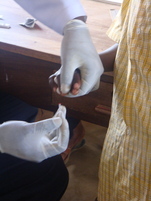What are the challenges of scaling up rapid diagnostic tests in Sub-Saharan Africa?
28 January 2014

The World Health Organization recommends using malaria rapid diagnostic tests (RDTs) and prescribing antimalarials only to patients who have a positive test result. As programmes gear up to implement this practice, researchers have reviewed literature and provided
guidance to help design policies.
The T3: Test. Treat. Track initiative of the WHO Global Malaria Programme sets targets of universal access to diagnostic testing in the public and private health care sectors as well as at the community level. Researchers examined the operational challenges and gaps in knowledge to implement this strategy.
Probably the biggest challenge in scaling up and monitoring good quality in RDT programmes will be to provide adequate supplies of rapid diagnostic tests and appropriate training to all health workers in endemic areas, indefinitely. Most areas often report stockouts, therefore it is critical to sustain supply to ensure that tests are used persistently.
Global strategies to control and eliminate malaria will also depend on sustained access to Artemisinin-based combination therapy (ACT) – the WHO recommended first line treatment for P. falciparum malaria – in public and private health facilities.
Difficulties in local health care settings
In many local clinics in areas with poor resources, the high patient load creates challenges in implementing new policies and motivating staff, and employing new staff to conduct malaria testing is an additional high cost. The current lack of access to blood tests in many clinics leads to frequent presumptive treatment. Both these factors mean that health workers often decide to prescribe antimalarial treatment based on the patient’s signs and symptoms rather than by using the test.
When tests are available and are used, health workers frequently do not prescribe treatment according to the result of the test, which leads to a wastage of expensive ACTs and RDTs. In some cases, it is the patient that puts pressure on health care providers, contributing to overtreatment.
Rationalising use of ACTs is safe
The group of researchers, which includes Dr Toby Leslie from the ACT Consortium, reviewed studies in Africa where RDTs had been compared with either clinical diagnosis (based on signs and symptoms) and microscopy – and found that rates of overtreatment persisted when RDTs are used in both settings.
However, in two studies in Tanzania and Uganda, children with fever who tested negative for malaria and didn’t receive malaria treatment suffered no ill effects. Rationalising the use of antimalarials to patients who test positive for malaria proved to be safe and reduced the antimalarial drug consumption considerably.
“Community health workers and the private for-profit sector – which is often unregulated – also play a crucial role in the scale up of RDTs,” said Dr Leslie. “The majority of suspected malaria episodes are initially treated by private health workers or community health workers who, in most areas, don’t have access to microscopy or RDTs to carry out malaria testing.”
“In order to fulfill the aims of the T3 strategy, all providers should be appropriately targeted to provide diagnosis which will improve targeting of treatment and reduce drug wastage,” he added.
Further information
- Read the journal article: Scale-up of Malaria Rapid Diagnostic Tests and Artemisinin-Based Combination Therapy: Challenges and Perspectives in Sub-Saharan Africa (Plos Medicine)
- Learn more about how the ACT Consortium is working to improve the targeting of ACTs
- Learn more about how the ACT Consortium is working to improve the access to ACTs
- Read more about the WHO’s T3: Test. Treat. Track Initiative

